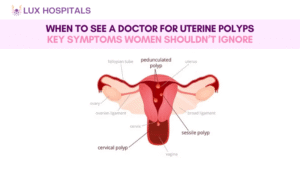What Causes Vaginal Discharge with Odor? Common Reasons You Shouldn’t Ignore

Vaginal discharge is a normal physiological process that keeps the vagina clean and infection-free. However, a strong or unusual smell accompanying it may indicate an underlying issue that should not be overlooked. Maintaining reproductive and general health requires understanding the potential causes of vaginal discharge odor. Changes in discharge are common for women, although not all causes are benign. You can take prompt action to safeguard your health and prevent consequences if you know what is normal and what requires medical treatment.
Common Causes of Vaginal Discharge with odor
Foul-smelling vaginal discharge is often a sign that something is disrupting the natural balance of bacteria or hormones in the vaginal environment. Recognizing the symptoms early can help prevent complications and ensure timely treatment. Below are the most common reasons why vaginal discharge odor occurs and what each one might mean for your health.
1. Bacterial Vaginosis (BV)
Bacterial Vaginosis is one of the most common causes of vaginal discharge odor. It results from an imbalance in the natural bacteria found in the vagina, leading to a fishy-smelling, grey or white discharge. Women with BV may also experience itching, burning during urination, and mild irritation.
- Causes: douching, multiple sexual partners, or disrupted vaginal pH
- Treatment: prescribed antibiotics such as metronidazole or clindamycin
- Prevention: avoiding scented feminine products and maintaining a healthy vaginal microbiome
2. Trichomonas.
Trichomonas vaginalis is a parasite that causes trichomoniasis, a sexually transmitted ailment. It typically causes a greenish-yellow, frothy discharge with a strong, unpleasant smell. Other symptoms may include genital itching, pain during sex, and burning during urination.
- Causes: unprotected sex with an infected partner
- Treatment: a single dose of antibiotics like metronidazole or tinidazole
- Prevention: regular STI screening and use of condoms
3. Yeast Infection (Candidiasis)
While yeast infections typically cause a thick, white, odorless discharge, they may also develop a sour or bread-like odor if left untreated. This condition results from an overgrowth of Candida albicans, a fungus naturally present in the vaginal flora. Accompanying symptoms include itching, redness, and swelling.
- Causes: antibiotic use, diabetes, pregnancy, or weakened immunity
- Treatment: topical creams or antifungal drugs like fluconazole
- Preventive : measures include avoiding needless antibiotics and using breathable undergarments.
4. Poor Hygiene Practices
Inadequate hygiene or excessive cleaning can disrupt the vaginal ecosystem, leading to vaginal discharge odor. Failing to change underwear daily or wearing tight, non-breathable fabrics may contribute to bacterial overgrowth. Overwashing or using scented soaps can strip away natural protective bacteria.
- Causes: improper washing habits or tight clothing
- Treatment: improved hygiene and avoiding irritants
- Prevention: washing with water only or pH-balanced cleansers and wearing cotton underwear
5. Retained Foreign Object (Tampon or Condom)
Leaving a tampon or condom inside the vagina for too long can cause a foul-smelling, brownish discharge. This is due to bacterial growth around the retained object, which may lead to infection or toxic shock syndrome if not removed promptly. Symptoms can escalate to fever, dizziness, or pelvic pain.
- Causes: forgotten tampon or condom after intercourse
- Treatment: medical removal of the object and antibiotics if infection is present
- Prevention: tracking menstrual product changes and using reminders
6. Sexually Transmitted Infections (STIs)
STIs like gonorrhea and chlamydia can cause vaginal discharge odor along with unusual colors (yellow or green) and discomfort. These infections often go unnoticed in the early stages, increasing the risk of complications like pelvic inflammatory disease (PID). Odor, in such cases, usually indicates infection and inflammation.
- Causes: unprotected sex with an infected person
- Treatment: antibiotic therapy based on the specific infection
- Prevention: routine STI testing and safe sex practices
7. Hormonal Imbalances
Estrogen levels fluctuating during the menstrual cycle, pregnancy, or menopause might alter the smell and consistency of vaginal discharge. Postmenopausal women often experience atrophic vaginitis, which leads to dryness, thinning vaginal walls, and vaginal discharge odour. Hormonal shifts can also reduce the vagina’s protective acidic pH.
- Causes: menopause, birth control pills, or thyroid issues
- Treatment: hormone therapy or topical estrogen
- Prevention: regular gynaecological checkups and hormone evaluations
8. Cervical or Vaginal Cancer
In rare cases, persistent vaginal discharge odor may signal cervical or vaginal cancer. The discharge is often watery, pink, or foul-smelling and may be accompanied by abnormal bleeding. Any long-lasting symptoms should prompt immediate medical attention.
- Causes: HPV infection, smoking, or family history
- Treatment: surgery, radiation, or chemotherapy, depending on the stage
- Prevention: HPV vaccination and routine Pap smears
When to See a Doctor?
You should consult a healthcare provider if:
- The vaginal discharge odour is strong or foul-smelling
- There is itching, burning, or redness
- The discharge is green, yellow, or bloody
- You experience pelvic pain or fever
Serious infections could result from ignoring these signs or reproductive complications. Early intervention ensures better outcomes and faster relief.
Conclusion
Although vaginal discharge odor might be unpleasant, it’s frequently a sign of a medical ailment that can be treated. Effective therapy and long-term health depend on determining the reason, whether it is an infection, a hygiene problem, or a hormone change. Don’t disregard odd or lingering odors; prompt diagnosis guarantees better results and peace of mind. You can take control of your vaginal health by paying attention to your body and getting help when something doesn’t feel right. You can regain equilibrium, eliminate smells, and feel better with the correct care. You can restore balance, eliminate odor, and feel confident in your everyday life with the proper care.
Frequently Asked Questions
Smelly discharge in females is often caused by bacterial vaginosis, trichomoniasis, or poor hygiene. It may also result from a retained tampon, hormonal changes, or STIs. A doctor should evaluate any persistent vaginal discharge odor.
Depending on the cause, treatment options could include antibiotics for infections, antifungals for yeast, or hormonal therapy for imbalances. Maintaining good hygiene and avoiding irritants also helps. Addressing the root cause is key to eliminating vaginal discharge odor.
Abnormal discharge may smell fishy, sour, or foul and is typically different from your typical scent. Unusual colors or textures may also accompany it. Such changes often indicate an infection or hormonal disruption causing vaginal discharge odor.
Yeast infections usually don't have a strong odor, but they can produce a sour or bread-like smell when severe or untreated. The discharge is typically thick and white with intense itching, which can contribute to vaginal discharge odor in some women.
You should be concerned if the stench is strong, persistent, or fishy and is accompanied by unusual discharge, itching, or pelvic pain. These symptoms could indicate a retained item or illness. If the odor of vaginal discharge does not go away right away, a medical assessment is required.






















